Art Fairs
Dinosaur Bones and Rare Minerals Have Lured an International Jetset of Collectors Back to a Rebooted Masterpiece London
The fair is mixing up its offerings alongside fine art for its first in-person edition after a Covid hiatus.
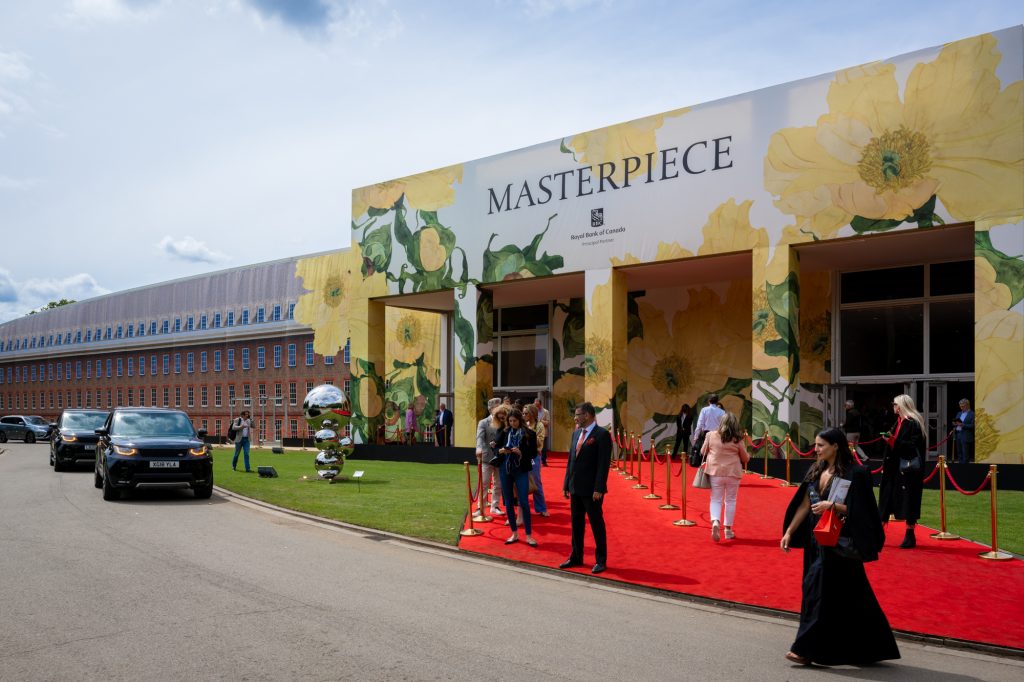
The fair is mixing up its offerings alongside fine art for its first in-person edition after a Covid hiatus.

Vivienne Chow

Masterpiece London returned with a celebratory opening last week for its first IRL edition after two years of Covid-related hiatus. The fair, which is on view until July 6, has brought together 128 exhibitors who presented a vast range of fine art, antiquities, and collectibles. Yet these exquisite art objects on view are somewhat overshadowed by the natural wonders of world: dinosaur skulls, rare mineral sculptures, and gogottes were the talk of the show.
Like the European Fine Art Fair (TEFAF), which takes place in Maastricht and New York, Masterpiece London has positioned itself as a high-end fair since it was founded in 2010. It presents pretty objects ranging from traditional fine art to design, furniture, jewelry, and antiques. So when TEFAF decided to stage its post-Covid reboot at the end of June, crowding into the usual slot of Masterpiece London, it caused quite a lot of stress for dealers and art connoisseurs alike, who needed to decide which fairs to go to in Europe during a hectic June marked by chaotic travel, in a month already hosting Art Basel in Basel and Brussels Art Fair (BRAFA).
Tuesday’s preview, however, proved that such worries may not be necessary, as the aisles of the fair—housed in a bespoke marquee on the South Grounds of the Royal Hospital Chelsea—were jam-packed with visitors in fancy dresses and shoes, with well-groomed puppies at their side. Some of them flew in from North America. There was also a noticeable presence of East and South Asian faces. Free flow of champagne and rosé certainly helped to fuel the jovial atmosphere, but the opportunity to reconnect with old clients and meet with new people, as well as robust sales, were what kept the dealers happy (except for a few who moaned about over-stretching themselves between Masterpiece London and TEFAF Maastricht the week before).
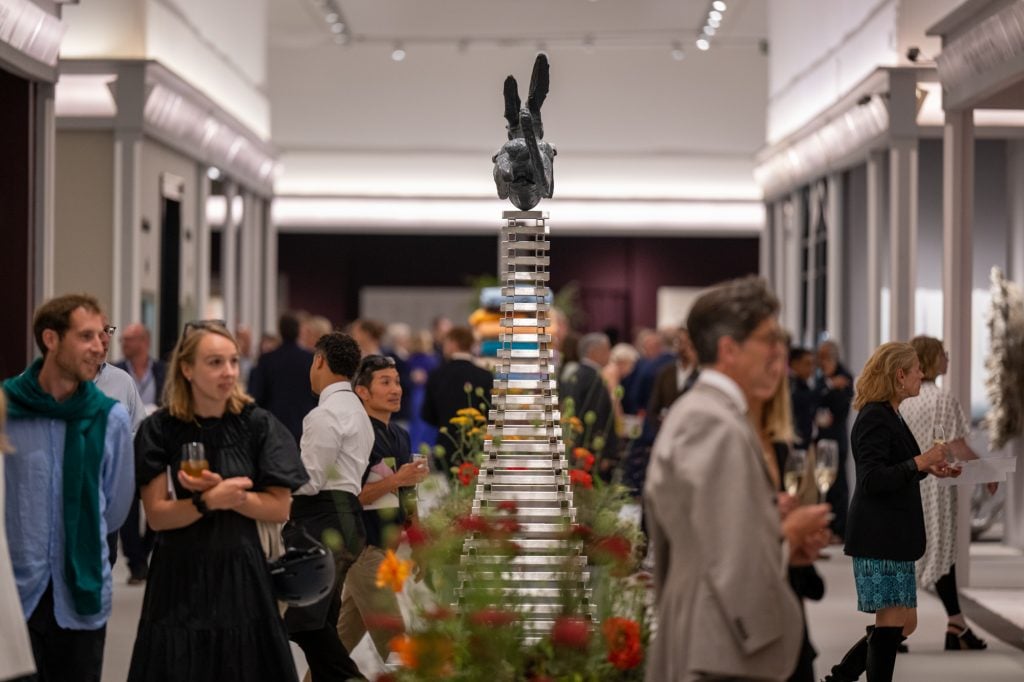
Aisle view at Masterpiece London 2022, Ben Fisher Photograph, Courtesy Masterpiece London.
“It’s been really positive. In 2019, people complained about the art fair fatigue. But what I’m feeling now is the exact opposite,” Lucie Kitchener, managing director of Masterpiece London, told Artnet News. Being in London also gave the fair an advantage, she noted, as people wanted to visit London during the times where the auctions and Wimbledon are also taking place concurrently.
The strong presence of Asian visitors, primarily Mandarin- and Cantonese-speaking art lovers, could be a result of the fair’s previous work in Hong Kong, Kitchener noted. After being acquired by Art Basel’s parent company MCH nearly five years ago, Masterpiece London actively tried to expand to Asia through Hong Kong, where Art Basel runs its Asian edition. The London fair partnered with Fine Art Asia and made a presence in Hong Kong in 2019 during the peak of the protests.
The gloomy economic outlook caused by the recent stock market downturn and surging inflation seemed to have little impact on the fair, especially on the sales of modern names and historic pieces. “When I talk to people about why they bought, their reasons are not financial,” noted Kitchener.
The total number of exhibitors this year is down from the last in-person, pre-Covid edition in 2019, when 157 took part, but there are 30 newcomers, including a few dealers from Asia, such as Hong Kong’s 3812 Gallery, which also has a space in London, and Tang Contemporary Art, which operates in Beijing, Hong Kong, Bangkok, and Seoul. The New Delhi-based Dhoomimal Gallery, one of the oldest contemporary art galleries in India also joined the fair this year. Fine Minerals International from the U.S., another first-timer, was arguably the most talked about booth during the opening days.
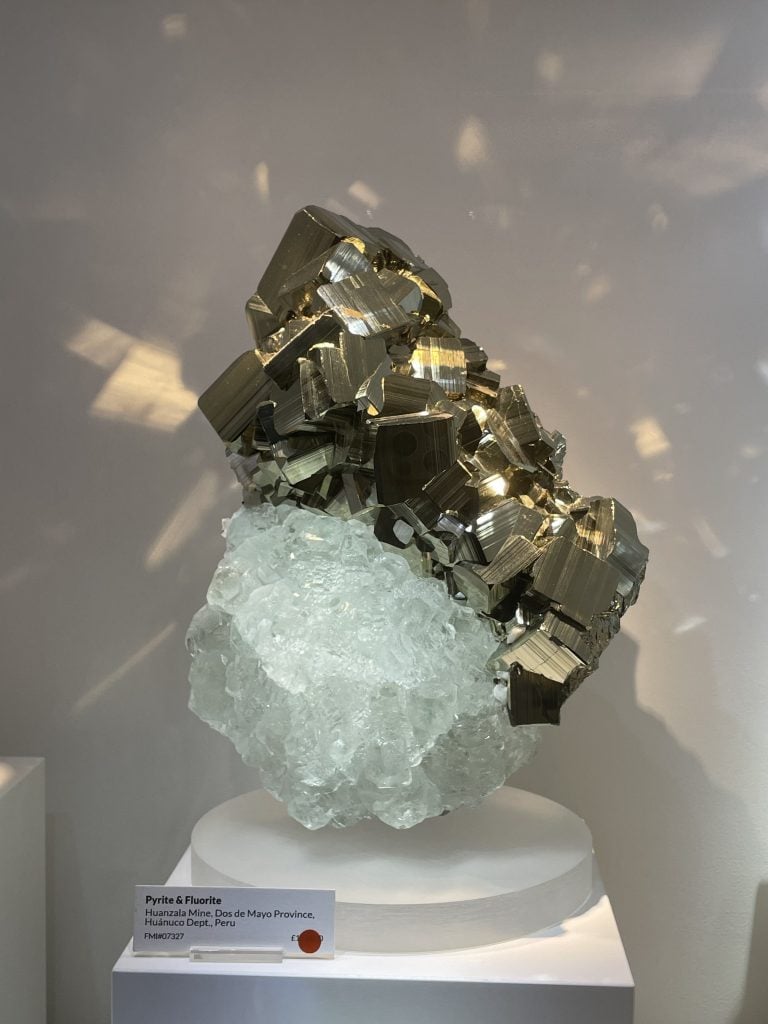
Pyrite & Fluorite by mother nature, on show at Fine Minerals International at Masterpiece London 2022. Photo: Vivienne Chow
“The response is overwhelming,” said Daniel Trinchillo, president of Fine Minerals International, which brought crystallized mineral specimens to Masterpiece London for the first time. The crowd on the opening night was in awe of these colorful pieces, which looked like abstract sculptures. “Many people have never seen mineral specimens presented this way,” said Trinchillo.
The objects were priced for between “a five-digit sum” and $2 million—the latter price tag was for a rare piece of tourmaline. Five pieces were sold by Friday, July 1, including a piece of Fluorite for $600,000.
Trinchillo said collecting crystallized mineral specimens used to be a niche hobby among a specific demographic professionally trained in the science of geology and mineralogy. But Hollywood composer James Horner began a trend in the early 2000s by collecting the pieces specifically for their beauty and artistic value, according to Trinchillo.
Masterpiece’s embrace of the trend seemed to turn out well this year. Crystallized mineral specimens were not the only wonders of the natural world that drew a following. Antiquity dealer David Aaron sold the skull of a triceratops dinosaur from the late Cretaceous period (circa 68 to 66 million years ago) that had been discovered in Wyoming, U.S., in late 2019. It was bought by a private collector for an undisclosed sum. ArtAncient, from London, sold eight pieces of gogottes (millions-of-years old sandstone) for between £4,500 ($5,442) to £150,000 ($181,422) each.
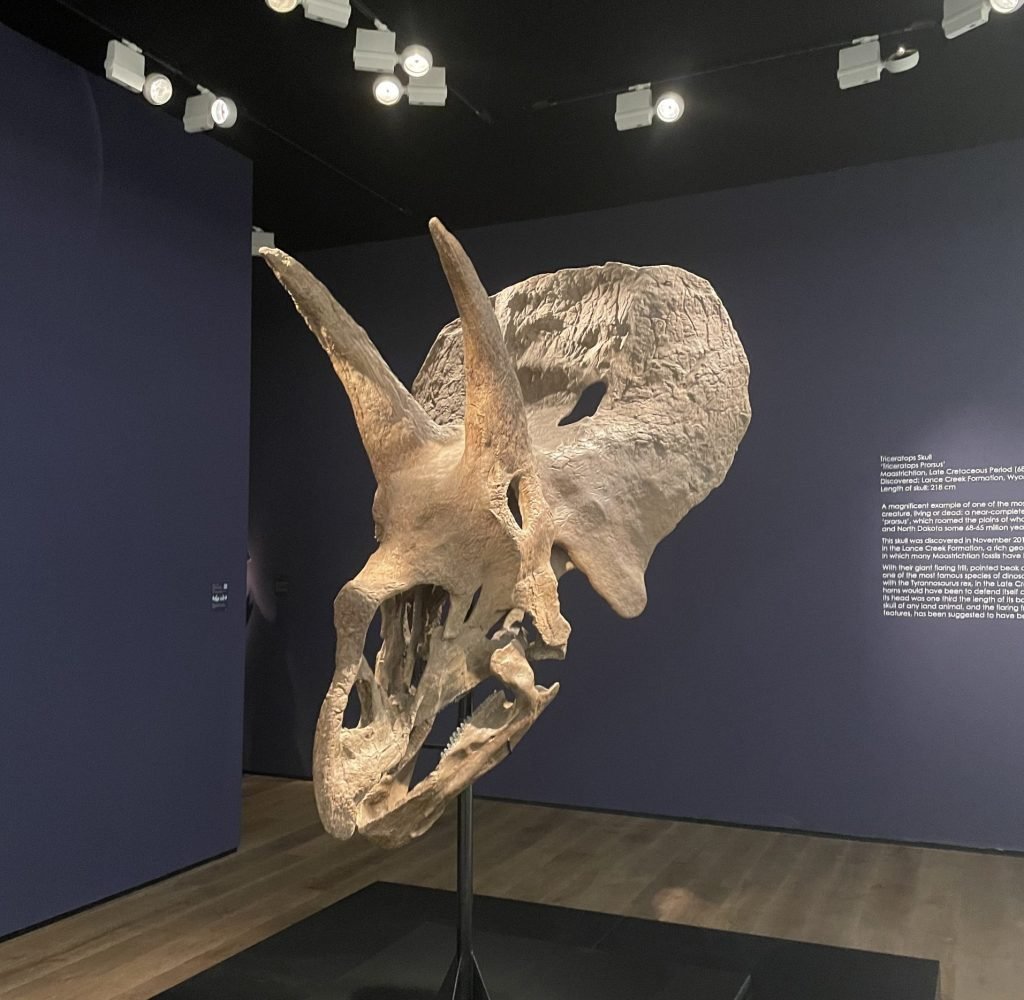
A skull of Triceratops sold to a private collector by dealer David Aaron at Masterpiece London 2022. Photo: Vivienne Chow.
Some galleries dealing in modern and contemporary art also reported satisfactory sales. London-based Waddington Custot, one of the first-time exhibitors, sold a watercolor work by the 90-year-old Peter Blake for a price in the region of £100,000 ($120,948) to £150,000 ($181,422). The gallery also sold a 2002 painting by Michael Craig Martin for around £100,000 ($120,948), and a Richard Estes’ photorealist painting for a price within the range of £120,000 ($145,137) to £130,000 ($157,232).
U.S. gallery Sundaram Tagore, which also operates in Singapore, sold a Susan Well painting for $97,000, a stainless steel work by Zheng Lu for $25,000, and a work on paper by Hiroshi Senju for $320,000. Tang Contemporary sold three paintings of different scales by Jonas Burgert for €75,000 ($78,213) to €178,000 ($185,627) just hours after the show opened its doors. The gallery is also showing works from Ai Weiwei’s Lego zodiac series and Zhu Jinshi’s iconic paintings made with thick sculptural layers of oil paint, which the gallery said has drawn strong interests from local U.K. and European collectors. “As an Asian gallery participating in this very British art fair, we stand out for our selection,’ said Michela Sena, director of Tang Contemporary Bangkok.
3812 Gallery also reported robust sales from its debut, selling works by the Shanghai-born, Taiwan-based Asian modern master Hsiao Chin to London collectors for around $200,000 each. The gallery also sold a work by British artist Terry Frost for $120,000. “We have been hoping to cultivate our local collector base here but Covid made it impossible,” said the gallery’s co-founder Calvin Hui. The gallery, which has one of the largest booths at the fair, said it is prepared to stay with Masterpiece “for at least three to five years.”
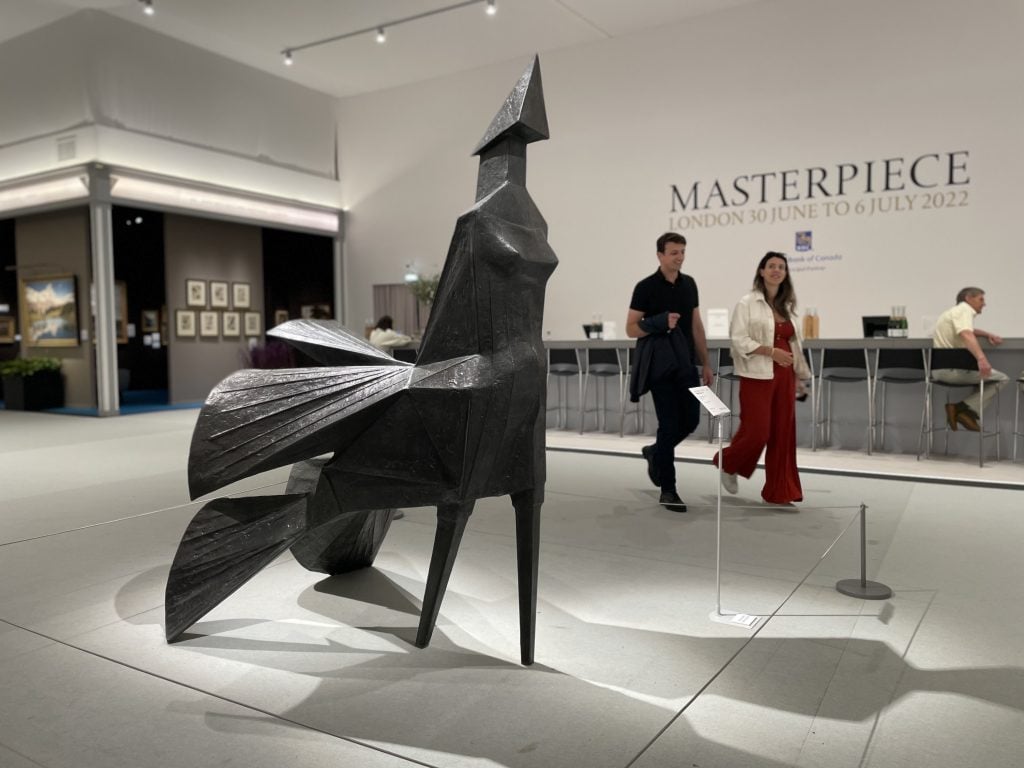
Lynn Chadwick, Walking Woman (1984). Sold for just under $2.4 million by Osborne Samuel at Masterpiece London 2022. Photo: Vivienne Chow.
U.K. dealers also did particularly well, especially those who deal in artists from the modern period. Karen Taylor, who presented a range of once overlooked female artists, was among one of the ecstatic dealers during the first two days of the fair. Two watercolor works by Scottish pre-Raphaelite painter Alice Boyd, as well as a watercolor painting from 1800 by Sarah Stone, were reserved by museums. She had also sold works in the range of £10,000 ($12,095) to £100,000 ($120,948) in the first couple days.
Another happy U.K. dealer was Peter Osborne, co-founder of Osborne Samuel Gallery, who sold eight works during the first two days in the range of tens of thousands to hundreds of thousands of dollars, including works by Henry Moore. His biggest sale was a Lynn Chadwick sculpture for just under £2 million ($2.4 million) to a London-based collector.
“We are very happy to be back. The top clients are coming back. A lot of people came to town this week despite TEFAF. It feels like things are going back to pre-pandemic,” Osborne told Artnet News. Does the economy have any impact on sales? “During times like these, people are looking into diversifying their portfolio. This is a time that is good for blue-chip works. This is good for us,” he noted.
Masterpiece London runs until July 6.